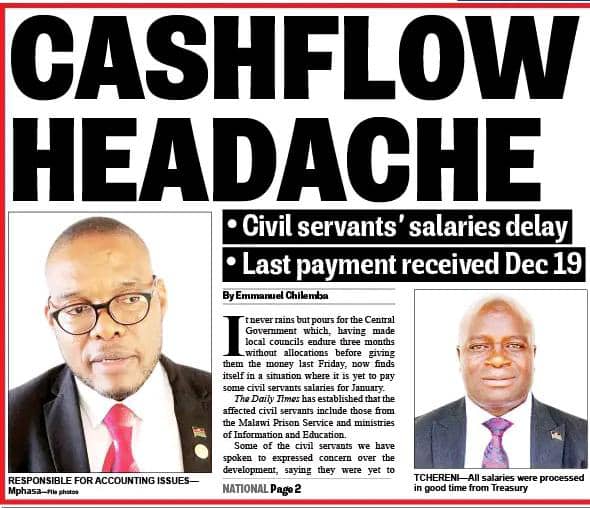By Burnett Munthali
In a troubling turn of events, the central government of Malawi is facing increasing financial difficulties, with multiple administrative setbacks that have caused growing discontent among both local government officials and civil servants. According to a front-page report in The Daily Times, the government’s financial mismanagement is becoming more apparent as it continues to struggle with timely payments and allocations. The government, which had already delayed funding to local councils for over three months, now finds itself in the uncomfortable position of failing to pay civil servants their January salaries on time.
The situation has caused a ripple effect across various sectors, with local councils bearing the brunt of the government’s financial woes. These councils, which rely heavily on central government allocations for their operations, were left without funding for an extended period, creating a bottleneck in service delivery and local development projects. While the government finally released the funds last Friday, the long delay had already taken a toll on local operations, affecting everything from infrastructure projects to essential services like waste management, health care, and education.
Local government officials, who had been forced to make do without the funds they were promised, have expressed frustration at the government’s inability to adhere to budgetary timelines. The delays left councils scrambling to meet their basic operational costs, and many had to resort to borrowing or reassigning funds from other projects to keep the wheels of governance turning. This inability to meet financial obligations not only undermines local governance but also erodes the trust and confidence that citizens have in their government’s ability to manage public funds effectively.
As if this issue was not enough, the government’s failure to pay civil servants their January salaries has exacerbated an already tense situation. With the government unable to meet its obligations to its employees, civil servants are now facing the unsettling reality of having to work without the assurance of timely remuneration. The delay in salary payments has led to widespread discontent among public servants, many of whom are already struggling with the effects of rising costs of living. The situation is likely to create tension within the civil service, as employees express their dissatisfaction and frustrations with a government that seems unable to fulfill its most basic financial commitments.
The delayed salary payments have also raised questions about the government’s broader financial management. Critics argue that this situation is symptomatic of deeper systemic issues within the government’s budgetary processes, including poor planning, misallocation of funds, and a lack of transparency. While the government has yet to provide a clear explanation for the salary delays, it is clear that the financial strain is beginning to undermine its credibility, both domestically and internationally.
Experts suggest that the government’s inability to manage its finances could have far-reaching consequences for the country’s development goals. If the trend continues, it may result in reduced investor confidence, a strained relationship with international donors, and a slowdown in economic growth. The situation could also further undermine the delivery of essential public services, putting the most vulnerable populations at risk.
Despite these challenges, the government has yet to take significant steps toward resolving its financial issues in a sustainable manner. While the release of funds to local councils last Friday was a positive development, it remains to be seen whether the government will be able to maintain the momentum and address the root causes of the financial crisis.
The current situation calls for urgent action from the government to restore confidence in its ability to manage public finances. Civil servants and local councils alike are looking for assurance that the government will prioritize the timely payment of salaries and allocations, and that it will take meaningful steps to address its financial management challenges. If the government fails to act swiftly and decisively, the financial instability could spiral further, leading to more widespread dissatisfaction and potential unrest.
As the government navigates this difficult period, it will be crucial for it to provide clarity and transparency to the public, ensuring that its actions are aligned with its promises to improve the lives of Malawians. Only then can the government begin to regain the trust and confidence that is so crucial for effective governance and national development. The coming weeks will be pivotal in determining how the situation evolves and whether the government can address the challenges that lie ahead.




